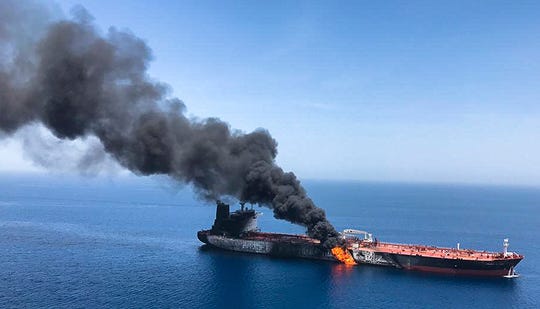Joe Sestak
President Trump called Iran "nothing but trouble" after saying he heard from the U.K. that tankers were seized in the Strait of Hormuz. USA TODAY
Tensions between Iran and the United States have recently reached dangerous new heights — which could result in spiraling reprisals devolving into war.
Having served in the military, I know that militaries can stop a problem, but they can’t fix a problem. This is why I supported the Iran nuclear accord, and still support it today as the best framework for maintaining peace and security for us and our allies. As tensions continue to ratchet up, we must own up to the fact that we are to blame. We broke our word.
The latest development is the recent announcement from Tehran that Iranians have begun enriching uranium above limits agreed upon in 2015. This does not mean Iran is significantly closer to developing a nuclear weapon, but it does mean they no longer comply with the agreement.
Of course, we first violated the terms by withdrawing from the agreement, in May 2018, after establishing sanctions on Iran. At the time of our withdrawal, Iran was in full compliance with International Atomic Energy Agency (IAEA) inspectors on the ground verifying compliance every day.

In this June 13 file photo, an oil tanker is on fire in the sea of Oman. A series of attacks on oil tankers near the Persian Gulf has ratcheted up tensions between the U.S. and Iran -- and raised fears over the safety of one of Asia’s most vital energy trade routes. (Photo: AP)
The decision by the Trump administration to withdraw was a huge, strategic mistake. It makes negotiating disarmament with other countries — such as North Korea — immeasurably more difficult, because those countries now have every reason to suspect we will not uphold our side of any bargain.
The Iran deal was not all-inclusive: It did not deal with Iran’s ballistic missile program, nor with Iran’s meddling in the affairs of their neighbors and support of violent extremists, and had an expiration date. But by fulfilling its fundamental purpose — preventing Iran from developing nuclear weapons — it was successful.
Also, critically, it was building trust between Iran and the international community. It takes time to repair fractured relationships, especially when there are decades of animosity to overcome, and the nuclear agreement was designed to be a decade-long first step toward peace and reconciliation.
The recent high-stakes drama in the Straits of Hormuz, during which two foreign oil tankers were attacked, followed by Iran shooting down of a U.S. drone, brought us to the brink of war — a terrible prospect. During my years in the Navy and in the White House, I was involved in assessing how a war with Iran would go. In summary: It would be ugly.
DIG DEEPER
Launching a ground war against Iran would require hundreds of thousands of troops for a “regime change followed by nation-building” operation, as we attempted in Iraq. Iran has a much more modern military, more than double Iraq’s population, and almost four times the landmass. It also has a network of international operatives capable of launching terrorist attacks in dozens of countries.
The other option would be an aerial bombardment campaign targeting Iran's nuclear infrastructure. As I have argued time and again, such an effort is unlikely to permanently succeed and would surely result in terrible consequences for Israel and our forces in the region.
Iran’s nuclear facilities are broadly distributed and deeply buried. The Fordow enrichment facility, for example, is under 200 to 300 feet of solid rock. A bombing campaign would result in Iran shutting down ship traffic in the Straits of Hormuz — through which 20% of the world’s oil supply must pass — and retaliating against U.S. forces and our allies, particularly Israel.
What’s more, our carriers could not survive long in the Persian Gulf due to stealth mini-submarines, mines and proximity to Iranian missile batteries. We would be forced to operate from the open sea, slowing down our operations. And on top of it all, experts believe Iran could rebuild within just four years all of the nuclear infrastructures we might destroy.
The Iran deal was working. As a solution to the problem of Iran developing nuclear weapons, it was actually working quite well. We need to return to the negotiating table. Diplomacy fixed this problem before. Diplomacy can do it again.
Joe Sestak is a former Navy admiral, former White House director for defense policy and former congressman (PA-7), and a current Democratic presidential candidate.
